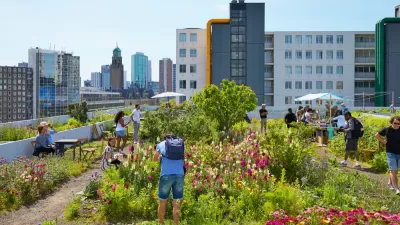The Denver Post gives a preview of some of the big questions facing Denver voters in November.
Jon Murray takes a dive into Referred Questions 2A through 2H and Initiated Ordinance 300 on the November citywide ballot in Denver.
Referred Questions 2A through 2H pitch a $937 million bond package that includes funding for more than 460 projects across Denver. There are projects under the categories of transportation and mobility (2A), cultural facilities (2B), and ambulatory care center (2C), public safety facilities (2D), library system renovations (2E), parks and open space facilities (2F), and general public facilities. According to Murray the entire package is the first general obligation bond requested of voters since 2007’s voter-approved $550 million Better Denver Bonds, which will wrap up its building programs this year.
Then there is Ordinance 300, which is a voter-initiated ballot item "[aimed] to reduce Denver’s urban “heat island” effect by requiring the roofs of large new buildings to incorporate rooftop gardens or solar panels," according to Murray.
The green-roof requirements — along with new standards — would apply to most new buildings of at least 25,000 square feet, to existing buildings above that threshold when their roofs are replaced, and to existing buildings when additions cause their floor area to reach that threshold. Solar panels or “green roof” components would have to cover at least 20 percent of a roof’s surface, depending on the building’s size.
According to Murray, building and commercial real estate interests are gearing up to fight the measure.
FULL STORY: Denver 2017 election guide: A $937 million bond package and the Green Roof Initiative are on the ballot

Planetizen Federal Action Tracker
A weekly monitor of how Trump’s orders and actions are impacting planners and planning in America.

Chicago’s Ghost Rails
Just beneath the surface of the modern city lie the remnants of its expansive early 20th-century streetcar system.

San Antonio and Austin are Fusing Into one Massive Megaregion
The region spanning the two central Texas cities is growing fast, posing challenges for local infrastructure and water supplies.

Since Zion's Shuttles Went Electric “The Smog is Gone”
Visitors to Zion National Park can enjoy the canyon via the nation’s first fully electric park shuttle system.

Trump Distributing DOT Safety Funds at 1/10 Rate of Biden
Funds for Safe Streets and other transportation safety and equity programs are being held up by administrative reviews and conflicts with the Trump administration’s priorities.

German Cities Subsidize Taxis for Women Amid Wave of Violence
Free or low-cost taxi rides can help women navigate cities more safely, but critics say the programs don't address the root causes of violence against women.
Urban Design for Planners 1: Software Tools
This six-course series explores essential urban design concepts using open source software and equips planners with the tools they need to participate fully in the urban design process.
Planning for Universal Design
Learn the tools for implementing Universal Design in planning regulations.
planning NEXT
Appalachian Highlands Housing Partners
Mpact (founded as Rail~Volution)
City of Camden Redevelopment Agency
City of Astoria
City of Portland
City of Laramie




























